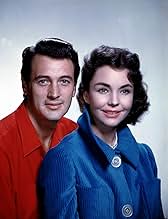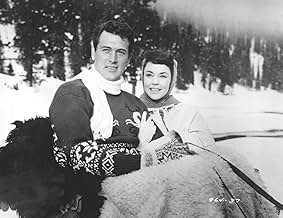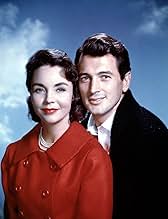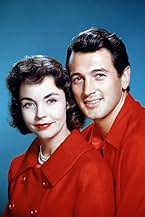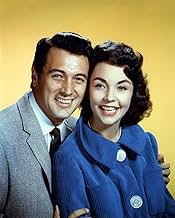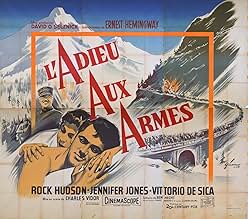NOTE IMDb
5,8/10
3 k
MA NOTE
Une infirmière anglaise et un soldat américain sur le front italien pendant la Première Guerre mondiale tombent amoureux, mais les horreurs qui les entourent mettent leur romance à rude épre... Tout lireUne infirmière anglaise et un soldat américain sur le front italien pendant la Première Guerre mondiale tombent amoureux, mais les horreurs qui les entourent mettent leur romance à rude épreuve.Une infirmière anglaise et un soldat américain sur le front italien pendant la Première Guerre mondiale tombent amoureux, mais les horreurs qui les entourent mettent leur romance à rude épreuve.
- Réalisation
- Scénario
- Casting principal
- Nommé pour 1 Oscar
- 1 victoire et 2 nominations au total
José Nieto
- Major Stampi
- (as Jose Nieto)
Georges Bréhat
- Captain Bassi
- (as Georges Brehat)
Luigi Barzini
- Court Martial Colonel
- (non crédité)
Memmo Carotenuto
- Nino the Doorkeeper
- (non crédité)
Avis à la une
Rock Hudson wasn't bad but it was painfully obvious that Jennifer Jones was a lot older than him. It was absurd she was supposed to be English when she sounded just as American as Hudson and Elaine Stritch. The film is spectacular but too overblown for a trifling romantic story.
A lot of people are being terribly unfair to this production of A Farewell To Arms. Not that it's a great film, it misses that by a good distance, but that even films that are the best adaptations of Ernest Hemingway's work fall far short for Hemingway purists. And David O. Selznick was far from a Hemingway purist.
No Selznick when it came to the career of his wife Jennifer Jones lost all kinds of sense of balance. Another reviewer was quite right, Jean Simmons, Joan Collins, Elizabeth Taylor all would have made acceptable Catherine Barkleys.
One thing also to remember that we're not even starting out with pure Hemingway to begin with. Both this version and the 1932 version that starred Gary Cooper and Helen Hayes are not just based on the novel, they are based on a play that was adapted from the novel by Laurence Stallings who wrote What Price Glory. The play ran for 30 performances in 1930 and starred Glenn Anders and Elissa Landi on Broadway. I suspect the Depression had a lot to do with the closing as it did many shows that year.
Originally John Huston was slated to direct and he had directed Jones in both We Were Strangers and Beat The Devil with little or no interference from Selznick. But Selznick fired Huston and replaced him with Charles Vidor because allegedly too much attention was paid to Rock Hudson and not enough to Jennifer.
That's ironic as all get out because the novel itself is as all Hemingway works is male chauvinistic in the extreme. If he wanted to showcase Jennifer, any Hemingway just ain't the vehicle. He should have used one of the Bronte sisters.
Since the novel is male oriented Rock Hudson makes a fine Fredric Henry, the idealistic man who volunteers on the Italian front as an ambulance driver to experience war so he can write about it when it's over. On that Italian front it didn't look like it was ever going to be over.
That's another problem with this work, how do you sell it to the movie going public, as a romance or an anti-war tract? If you're Adolph Zukor for Paramount or David O. Selznick probably romance is the aspect that does sell.
The third major character in the film is that of the Italian army doctor Major Rinaldi played here by Vittorio DeSica. This version is more faithful to the book and presents Rinaldi as a three dimensional character.
In the 1932 version Adolphe Menjou was Rinaldi and Menjou did fine with the part as your typical suave continental type. Here Rinaldi's outspokenness about the futility of the Italian campaign leads to tragedy. It also led to an Oscar nomination for Vittorio DeSica as Best Supporting Actor. It was the only recognition A Farewell To Arms got from the Academy and DeSica lost to Red Buttons for Sayonara.
Whether Huston or Vidor did them, the battle scenes and the scenes of retreat are shattering and moving. Given the unique problems of Hemingway and Selznick, we're lucky the film came out as good as it did.
No Selznick when it came to the career of his wife Jennifer Jones lost all kinds of sense of balance. Another reviewer was quite right, Jean Simmons, Joan Collins, Elizabeth Taylor all would have made acceptable Catherine Barkleys.
One thing also to remember that we're not even starting out with pure Hemingway to begin with. Both this version and the 1932 version that starred Gary Cooper and Helen Hayes are not just based on the novel, they are based on a play that was adapted from the novel by Laurence Stallings who wrote What Price Glory. The play ran for 30 performances in 1930 and starred Glenn Anders and Elissa Landi on Broadway. I suspect the Depression had a lot to do with the closing as it did many shows that year.
Originally John Huston was slated to direct and he had directed Jones in both We Were Strangers and Beat The Devil with little or no interference from Selznick. But Selznick fired Huston and replaced him with Charles Vidor because allegedly too much attention was paid to Rock Hudson and not enough to Jennifer.
That's ironic as all get out because the novel itself is as all Hemingway works is male chauvinistic in the extreme. If he wanted to showcase Jennifer, any Hemingway just ain't the vehicle. He should have used one of the Bronte sisters.
Since the novel is male oriented Rock Hudson makes a fine Fredric Henry, the idealistic man who volunteers on the Italian front as an ambulance driver to experience war so he can write about it when it's over. On that Italian front it didn't look like it was ever going to be over.
That's another problem with this work, how do you sell it to the movie going public, as a romance or an anti-war tract? If you're Adolph Zukor for Paramount or David O. Selznick probably romance is the aspect that does sell.
The third major character in the film is that of the Italian army doctor Major Rinaldi played here by Vittorio DeSica. This version is more faithful to the book and presents Rinaldi as a three dimensional character.
In the 1932 version Adolphe Menjou was Rinaldi and Menjou did fine with the part as your typical suave continental type. Here Rinaldi's outspokenness about the futility of the Italian campaign leads to tragedy. It also led to an Oscar nomination for Vittorio DeSica as Best Supporting Actor. It was the only recognition A Farewell To Arms got from the Academy and DeSica lost to Red Buttons for Sayonara.
Whether Huston or Vidor did them, the battle scenes and the scenes of retreat are shattering and moving. Given the unique problems of Hemingway and Selznick, we're lucky the film came out as good as it did.
Recently read the book...disappointed by the movie as it departed from the story in several key areas. The scenery was pretty.
The Gary Cooper/Helen Hayes version of A Farewell To Arms, well acted for the time it was made, seems dated now. The 1957 version of Hemingway's great romantic novel is, like The Sun Also Rises, another adaptation of one of Papa's masterpieces, pretty to look at, expensively made, and wooden in all other respects.
In this version Hudson is earnest but bland, Jones too old, De Sica in the wrong movie and Stritch, well, her acid nurse is one of the film's only bright spots.
But the real reason to see the film is the ravishing musical score by Mario Nasciembe. Talk about romantic! Talk about lush! Talk about unforgettable! Had the film been as good as it's musical score it would have been a classic; what A Farewell To Arms ultimately is though, is an overstuffed period piece and a tepid finale to the great David Selznick's career. (By the way should you want to skip the film, the soundtrack is currently available on CD.)
In this version Hudson is earnest but bland, Jones too old, De Sica in the wrong movie and Stritch, well, her acid nurse is one of the film's only bright spots.
But the real reason to see the film is the ravishing musical score by Mario Nasciembe. Talk about romantic! Talk about lush! Talk about unforgettable! Had the film been as good as it's musical score it would have been a classic; what A Farewell To Arms ultimately is though, is an overstuffed period piece and a tepid finale to the great David Selznick's career. (By the way should you want to skip the film, the soundtrack is currently available on CD.)
Of the top 6 reviews I currently see here, 3 are slamming Jennifer Jones for being too old, 1 is slamming producer David Selznick for being in the decline of his career, 1 is whining that it's not like the book, and 1 is slamming writer Hemingway for not doing any fighting in the war (Um... he was an ambulance driver).
While this film may not deserve an Academy award for best picture, it certainly deserves a decent review on IMDb dedicated to the film itself. So here goes my attempt.
"A Farewell to Arms" is a lavish production of a love story set against the backdrop of World War I. In that respect it's in the same genre as other classic war romances "Gone with the Wind", "Casablanca" and "Platoon ". Haha just checking to see if you're paying attention. Everyone knows "Casablanca" was not set in a war but an occupation.
Where "Farewell" differs from these other classics is in the distribution of war & romance. "Farewell" features far more battle scenes (4) compared to "Gone with the Wind" (zero) and "Casablanca" (zero). The result may be a bit disappointing in the romance department, and several reviewers (as well as the New York Times review on the film's release) have complained about the "lack of chemistry" between the two leads. I think this perception is simply due to the fact that less time is spent setting up the romance, putting more of a burden on the viewer to accept a relationship that simply happens. Viewers may also feel romantically cheated because this is not a traditional romance between two traditional individuals who dream of immediately getting married and having kids and a dog. But in fact this purposely informal, slightly dysfunctional romance is what ultimately made it interesting to me because it marked a change of formula in the age-old Hollywood romance.
If you see this movie, pay close attention to Jennifer Jones' excellent portrayal of a reluctant lover who is perhaps suffering from too many demons to actually fall in love completely, the way she wants to. She is riddled with insecurities, conflicts and possibly guilt, making her like the the stereotypical guy who can't commit. Meanwhile Rock Hudson plays a character more like the stereotypical lovesick schoolgirl. If you enjoy stereotype reversals like this, you'll definitely find yourself interested in their "lack of chemistry".
Was Jennifer Jones too old (late 30s) to play the role of Katherine as Hemingway had intended her (early 20s)? Probably. Did Jennifer get the part because she was married to producer Selznick? Absolutely. Does any of this make her a bad actress? No way. Short of Vivien Leigh, I think she was the best person to play the role as she did: the troubled lover whose cynical, morbid thoughts were always brewing not far away, despite her outwardly cheerful appearance. Actually I take back the thing about Vivien Leigh being better; the more I think about it, Jennifer was ideal for this sort of character.
A subplot involving Vittorio de Sica's war-weary character descending into madness is sure to catch your attention. It was actually my favorite part of the movie, and I wish they had spent more time on this complex character shift as well as his interesting polite antagonism of the church (with a spectacular short speech he says to the priest near the end). But alas, with the romance and the battle scenes already vying for screen time, Vittorio's story only got 2 or 3 dedicated scenes. They were powerful nonetheless.
Yes, as others mentioned, the ending seemed abrupt. But after thinking about it, I think it was perfectly in line with some of the interesting & unusual themes that the story set up. In short, this is not a straightforward soldier-meets-girl love story. The conflicts that are presented (particularly in Jennifer Jones' mysteriously troubled psyche) make this romance much more than meets the eye. If you enjoy wartime romances that are not always formulaic love stories (i.e. they may contain hidden dysfunctional surprises), check this one out.
While this film may not deserve an Academy award for best picture, it certainly deserves a decent review on IMDb dedicated to the film itself. So here goes my attempt.
"A Farewell to Arms" is a lavish production of a love story set against the backdrop of World War I. In that respect it's in the same genre as other classic war romances "Gone with the Wind", "Casablanca" and "Platoon ". Haha just checking to see if you're paying attention. Everyone knows "Casablanca" was not set in a war but an occupation.
Where "Farewell" differs from these other classics is in the distribution of war & romance. "Farewell" features far more battle scenes (4) compared to "Gone with the Wind" (zero) and "Casablanca" (zero). The result may be a bit disappointing in the romance department, and several reviewers (as well as the New York Times review on the film's release) have complained about the "lack of chemistry" between the two leads. I think this perception is simply due to the fact that less time is spent setting up the romance, putting more of a burden on the viewer to accept a relationship that simply happens. Viewers may also feel romantically cheated because this is not a traditional romance between two traditional individuals who dream of immediately getting married and having kids and a dog. But in fact this purposely informal, slightly dysfunctional romance is what ultimately made it interesting to me because it marked a change of formula in the age-old Hollywood romance.
If you see this movie, pay close attention to Jennifer Jones' excellent portrayal of a reluctant lover who is perhaps suffering from too many demons to actually fall in love completely, the way she wants to. She is riddled with insecurities, conflicts and possibly guilt, making her like the the stereotypical guy who can't commit. Meanwhile Rock Hudson plays a character more like the stereotypical lovesick schoolgirl. If you enjoy stereotype reversals like this, you'll definitely find yourself interested in their "lack of chemistry".
Was Jennifer Jones too old (late 30s) to play the role of Katherine as Hemingway had intended her (early 20s)? Probably. Did Jennifer get the part because she was married to producer Selznick? Absolutely. Does any of this make her a bad actress? No way. Short of Vivien Leigh, I think she was the best person to play the role as she did: the troubled lover whose cynical, morbid thoughts were always brewing not far away, despite her outwardly cheerful appearance. Actually I take back the thing about Vivien Leigh being better; the more I think about it, Jennifer was ideal for this sort of character.
A subplot involving Vittorio de Sica's war-weary character descending into madness is sure to catch your attention. It was actually my favorite part of the movie, and I wish they had spent more time on this complex character shift as well as his interesting polite antagonism of the church (with a spectacular short speech he says to the priest near the end). But alas, with the romance and the battle scenes already vying for screen time, Vittorio's story only got 2 or 3 dedicated scenes. They were powerful nonetheless.
Yes, as others mentioned, the ending seemed abrupt. But after thinking about it, I think it was perfectly in line with some of the interesting & unusual themes that the story set up. In short, this is not a straightforward soldier-meets-girl love story. The conflicts that are presented (particularly in Jennifer Jones' mysteriously troubled psyche) make this romance much more than meets the eye. If you enjoy wartime romances that are not always formulaic love stories (i.e. they may contain hidden dysfunctional surprises), check this one out.
Le saviez-vous
- AnecdotesRock Hudson turned down The Bridge on the River Kwai (1957), Sayonara (1957) and Ben-Hur (1959) in order to make this film. He later said this was the biggest mistake of his career.
- GaffesThe British nurses at the hospital all have American accents.
- Citations
Major Alessandro Rinaldi: She's very strange, very moody, who knows she might even prefer you to me.
- Crédits fousProducer David O. Selznick tries to imitate the opening credits of his classic film, "Gone With The Wind", by having the letters of the title "A Farewell to Arms" sweep slowly across the screen from right to left.
- ConnexionsFeatured in Au coeur du temps: The Ghost of Nero (1967)
Meilleurs choix
Connectez-vous pour évaluer et suivre la liste de favoris afin de recevoir des recommandations personnalisées
- How long is A Farewell to Arms?Alimenté par Alexa
Détails
Box-office
- Budget
- 4 353 000 $US (estimé)
- Durée2 heures 32 minutes
- Couleur
- Rapport de forme
- 2.35 : 1
Contribuer à cette page
Suggérer une modification ou ajouter du contenu manquant

Lacune principale
By what name was L'adieu aux armes (1957) officially released in India in English?
Répondre

